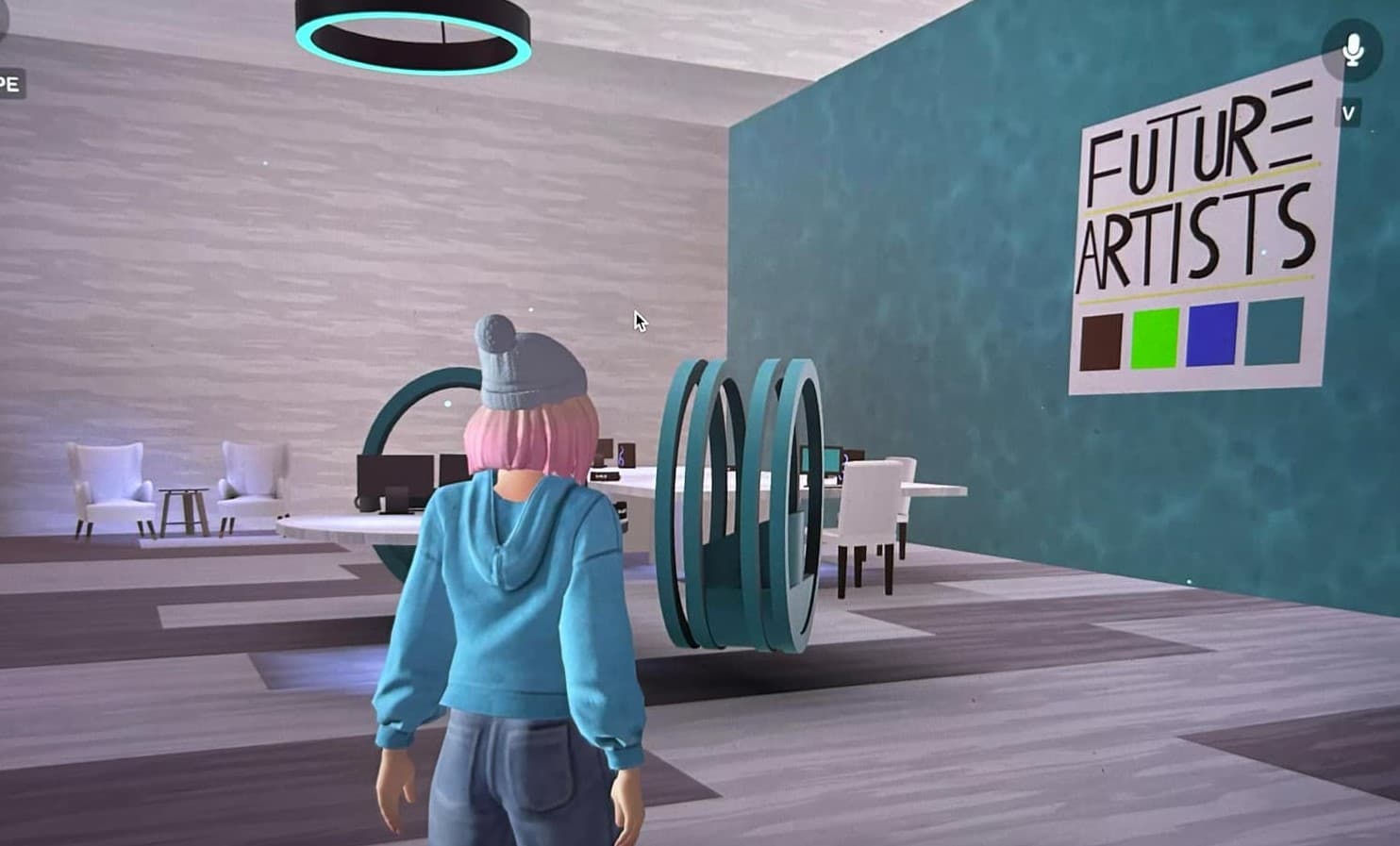Future Artists Launches Virtual Reality Academy to Transform Education for Generation Z and Beyond
Manchester, UK – 27th March 2025 – Future Artists announces the beta launch of its innovative educational project: The Future Artists Academy of Arts and Science, a pioneering virtual learning space built on Meta’s Quest platform, designed as a next-generation metaverse campus. This groundbreaking initiative uniquely integrates advanced artificial intelligence (AI) to guide learners around the virtual space, answer real-time questions, and enhance overall student engagement. It was made possible through a grant from the GM Business Growth Hub Innovation Navigator programme, identified as a funding opportunity following founder Mark Ashmore’s participation in a two-day innovation retreat led by Manchester Metropolitan University.
Brief Description:
The academy’s first phase includes a state-of-the-art virtual classroom accommodating up to 50 participants simultaneously, designed for immersive workshops, classes, and collaborative projects. Future Artists collaborated closely with Manchester-based design studio AVimmerse and virtual reality pioneer Tina Maxwell Wheeler to realise the overall vision of the project.
Virtual spaces within the academy leverage innovative artificial intelligence technologies, providing participants with a personalised and intuitive experience. AI-powered virtual assistants help students navigate the virtual environment, direct them to classes, and answer questions instantly—ensuring seamless, interactive, and supportive learning experiences.
Contrary to misconceptions, virtual reality (VR) education in the metaverse isn’t limited solely to VR headsets. The metaverse is essentially a virtual internet—classes might begin on traditional video calls, include independent digital research through online books, audio, and video resources, and culminate in VR group discussions, virtual field trips, or practical projects, such as building game assets or environments. VR provides tactile, interactive learning significantly deeper than traditional classroom lectures.
Virtual campuses can now be constructed at a fraction of the cost of physical infrastructure with the right creative talent. Future Artists boasts a network of over 1,600 virtual artists in their immersive arts lab, first established in 2016 specifically to deliver this educational vision almost a decade later.
Target Audience:
- Generation Z and Generation Alpha students seeking flexible, hybrid learning.
- Professionals and graduates in creative, theatre, immersive arts, and media industries requiring ongoing skills development.
- Educators and educational institutions seeking affordable and scalable immersive learning environments.
Launch Date and Location:
The project is currently in its Beta testing mode. To participate or learn more, please join the Future Artists Immersive Arts Lab group on Facebook and drop us a message.
Unique Selling Points:
- Integrated learning combining traditional online resources, collaborative virtual reality activities, and immersive practical experiences.
- Cost-effective, scalable infrastructure compared to traditional physical campuses.
- Innovative use of artificial intelligence (AI) offering personalised virtual assistants that guide students around the virtual environment, help direct learners to classes, and provide instant responses to real-time questions, enhancing engagement and learning outcomes.
- Access to over 1,600 immersive artists through Future Artists’ extensive network.
- Successfully running in beta mode for six months, delivering online workshops to the UK’s professional theatre and immersive arts producers, with over 1,000 participants attending organically through Future Artists’ established branding.
- Highly affordable pricing—comparable to the cost of a meal at Nando’s (£15 per workshop)—made possible by eliminating traditional costs such as space hire, travel, catering, and event administration.
- Digital-first education accessible via smartphones, VR headsets, and soon-to-be AR wearables, enabling global-local reach and attracting world-leading educators.
- Collaboration underway with the University of Manchester to develop the Academy’s first accredited MA Masters programme, significantly disrupting traditional university education models. By adopting the virtual academy model, Future Artists aims to dramatically reduce the cost of obtaining a Masters degree, increasing accessibility and enabling employers to affordably upskill their workforce, who can graduate with a recognised qualification.
Market Context:
The demand for virtual learning has grown significantly, driven by changing media and education preferences among Generation Z, as highlighted by founder Mark Ashmore’s recent PhD research. Post-pandemic trends indicate declining attendance at physical university campuses due to increasing remote learning options. Rapid technological advancements also demand continuous education for industry professionals, particularly in emerging technologies such as generative AI.
Quote:
“We’ve created the Future Artists Academy in direct response to evolving educational needs,” says Mark Ashmore, founder of Future Artists. “Today’s learners—especially Generation Z and Alpha—expect flexible, immersive, and interactive educational experiences. VR and the metaverse provide exactly that. We’re breaking barriers by making hands-on, high-quality education affordable, accessible, and genuinely transformative.”
About Future Artists:
Founded in 2009 by Mark Ashmore, Future Artists is an innovative creative community and educational enterprise at the intersection of art, technology, and social change. Founded in 2016, their immersive arts lab has brought together over 1,600 artists and technologists, pioneering new ways to harness virtual reality and digital technologies to transform education, creativity, and professional development.
